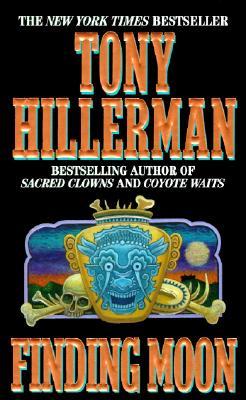At the start of his new novel, Finding Moon, Tony Hillerman apologizes “for wandering away from our beloved Navajo canyon country.” That apology, however, is unnecessary. While Finding Moon may not be Hillerman’s best novel to date, it takes its readers on a suspenseful ride through exotic country in just the wav that his best-selling Leaphorn-Chee mysteries have done.
In Finding Moon, Hillerman introduces a character we may well be hearing of again: Moon Mathias, a former combat infantryman turned small-town newspaper reporter and curmudgeon. Readers may be forgiven for not liking Mathias much at first, for Hillerman paints him, in the opening pages of his book, as a thoroughly unsympathetic man. Mathias is content to show up at work, bang out a few stories, suck down coffee as a placebo for the booze he has recently given up, and head back to a home he shares with a much younger girlfriend. Most of his energy is devoted to carefully avoiding emotional commitment of any kind.
His unentangled life snarls suddenly on the morning of April 12, 1975, when Mathias receives a call from airport security at Los Angeles International: his mother has taken ill while awaiting a flight for the Philippines. Not long before, his younger brother Ricky, an officer who resigned his commission to maintain a fleet of aircraft for a shadowy private concern in Southeast Asia, has been killed somewhere in Cambodia, “burned to ashes in a broken helicopter.” Mathias guesses that his mother was on her way to retrieve his brother’s remains.
But the situation is far more complicated than that. Mathias’s mother, it transpires, was not on her way to claim her son, but her son’s child, a girl born to a Cambodian woman. The government in Phnom Penh has collapsed that same day, helicopters are hiving on embassy roofs, and foreigners throughout Southeast Asia are in headlong flight from advancing communist armies. A time of purges, civil war, and payback is no time for a child of mixed descent to start life in this place; as the woman who enlists herself in his support, a Dutch expatriate name Osa Van Winjgaarden, explains to Moon, “The Klimers don’t like the Laotians, and the Laotians don’t like the Thais, and the Vietnamese don’t like the Montagnards, and nobody likes people who are mixed.”
Mathias sets out in his mother’s place to bring Ricky’s daughter to the United States. His voyage takes him into the tiger cages of Ferdinand Marcos’s Philippines, down atmospheric back alleys out of The Deer Hunter, and across the South China Sea in a leaky tub recalling the stories of Joseph Conrad. He races across the Mekong Delta in a commandeered armored personnel carrier, braving mountains and swamps and minefields with a ragtag crew of helpers. He wanders into and out of scenes of carnage that ring unpleasantly true (Mr. Hillerman, a veteran of World War II, dedicates his book to the men of his unit and to all those who have earned the Combat Infantry Badge), and he sees firsthand what a world in collapse looks like. The experience changes him, and when he finally finds his niece, Mathias discovers his elation at successfully completing his mission tempered by sorrow. “Now he could go home,” Hillerman writes. “If he could get there. But where was the joy he should be feeling?”
Much of Hillerman’s story is unlikely in the extreme, veering dangerously close to the comic-book antics of Rambo. The plotting is neither as thick nor as careful as in the Leaphorn-Chee mysteries for which Hillerman has become famous; the ending is just a little too pat; and the text is sprinkled with the throwaway cliches of the mystery genre.
But Moon’s voyage is as much about self-discovery as selfless rescue, which explains why many of the most interesting plot developments, coming in a priest’s confessional in Manila, where we discover just what has embittered Moon for so long, accord perfectly with Hillerman’s vision of Moon as a man of no attachments, a man with nothing much to recommend him, who comes nevertheless to appreciate the needs of others through a nearly religious awakening. As Moon comes to grips with loss, rootedness, and the meaning of family, Hillerman’s story acquires real depth, a depth that has not emerged before in his Navajo stories.
The result is a fine suspense novel that smacks more of Graham Greene than of John D. McDonald, or even the Tony Hillerman of old. Hillerman’s many admirers will not be disappointed with Finding Moon, even if they, with the author, find themselves far from familiar ground.
[Finding Moon, by Tony Hillerman (New York: HarperCollins) 288 pp., $24.00]

Leave a Reply